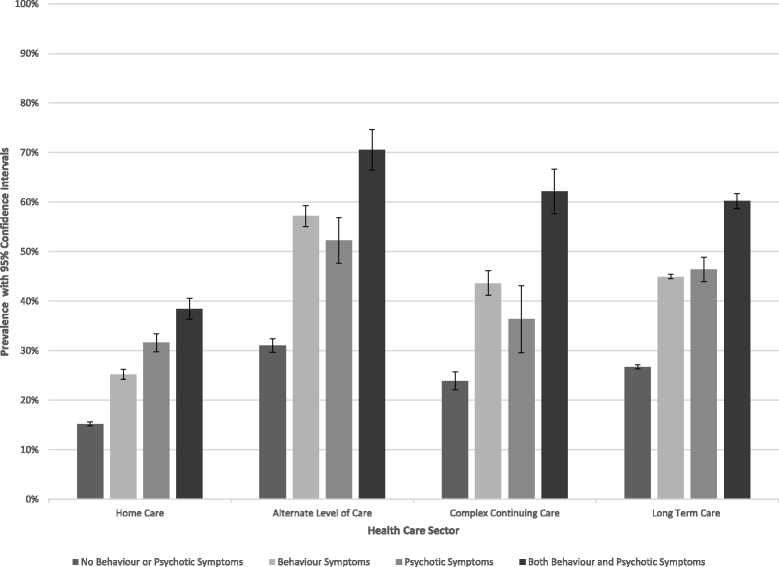Antipsychotics and dementia in Canada: a retrospective cross-sectional study of four health sectors
- PMID: 29061129
- PMCID: PMC5651600
- DOI: 10.1186/s12877-017-0636-8
Antipsychotics and dementia in Canada: a retrospective cross-sectional study of four health sectors
Erratum in
-
Correction to: Antipsychotics and dementia in Canada: a retrospective cross-sectional study of four health sectors.BMC Geriatr. 2018 May 31;18(1):128. doi: 10.1186/s12877-018-0819-y. BMC Geriatr. 2018. PMID: 29855269 Free PMC article.
Abstract
Background: Antipsychotic medications are not recommended for the management of symptoms of dementia, particularly among persons with no behavioral or psychological symptoms. We examine patterns of antipsychotic medication use among persons with dementia across health sectors in Canada, with a focus on factors related to use among those without behavioral or psychotic symptoms.
Methods: Using a retrospective cross-sectional design, this study examines antipsychotic use among adults aged 65 or older with dementia in home care (HC), complex continuing care (CCC), long-term care (LTC), and among alternate level care patients in acute hospitals (ALC). Using clinical data from January 1, 2009 to December 31, 2014, the prevalence of antipsychotic medication use was estimated by the presence of behavioral and psychotic symptoms. Logistic regression was used to identify sector specific factors associated with antipsychotic use in the absence of behavioral and psychotic symptoms.
Results: The total prevalence of antipsychotic use among older adults with dementia was 19% in HC, 42% in ALC, 35% in CCC, and 37% in LTC. This prevalence ranged from 39% (HC) to 70% (ALC) for those with both behavioral and psychotic symptoms and from 12% (HC) to 32% (ALC) among those with no symptoms. The regression models identified a number of variables were related to antipsychotic use in the absence of behavior or psychotic symptoms, such as bipolar disorder (OR = 5.63 in CCC; OR = 5.52 in LTC), anxious complaints (OR = 1.54 in LTC to 2.01 in CCC), and wandering (OR = 1.83 in ALC).
Conclusions: Potentially inappropriate use of antipsychotic medications is prevalent among older adults with dementia across health sectors. The variations in prevalence observed from community to facility based care suggests that system issues may exist in appropriately managing persons with dementia.
Keywords: Antipsychotics; Dementia; Home care; Long term care; interRAI.
Conflict of interest statement
Ethics approval and consent to participate
These analyses were approved by the University of Waterloo Office of Research Ethics (ORE#: 18,228).
Consent for publication
Not applicable.
Competing interests
The authors declare that they have no competing interests.
Publisher’s Note
Springer Nature remains neutral with regard to jurisdictional claims in published maps and institutional affiliations.
Figures
References
-
- Freund-Levi Y, Jedenius E, Tysen-Bäckström AC, Lärksäter M, Wahlund L, Eriksdotter M. Galantamine versus risperidone treatment of neuropsychiatric symptoms in patients with probable dementia: an open randomized trial. The Am J Geriatr Psychiatry. 2014;22(4):341–348. doi: 10.1016/j.jagp.2013.05.005. - DOI - PubMed
MeSH terms
Substances
LinkOut - more resources
Full Text Sources
Other Literature Sources
Medical


